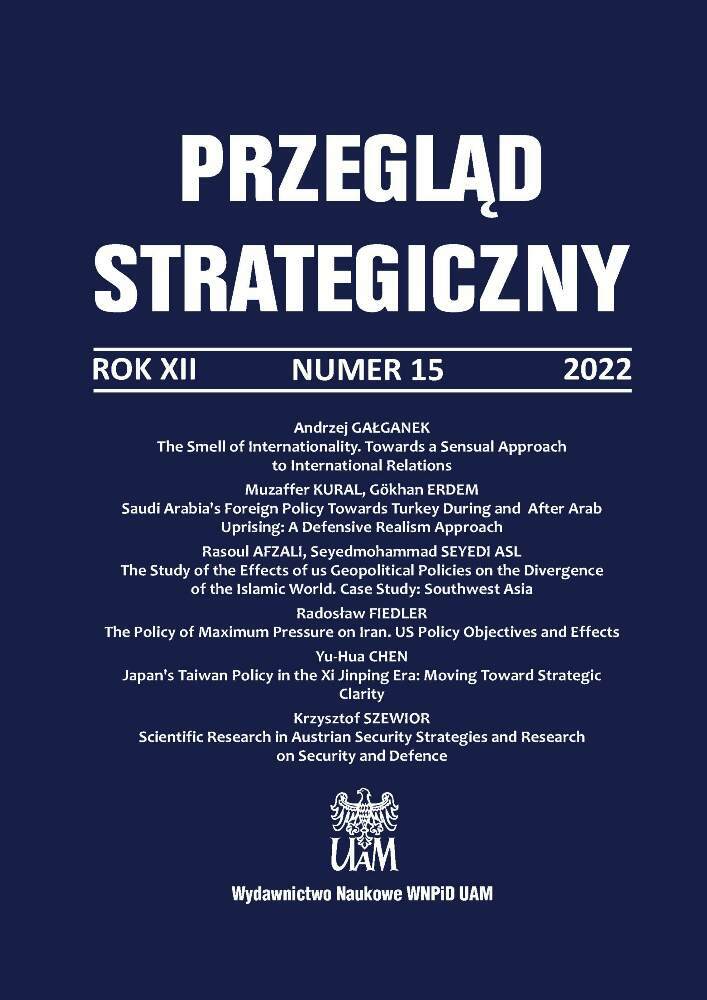Abstract
This article explores the postures of the last three former US presidents towards North Korean nuclear issue. The study applies Fairclough’s critical discourse analysis (CDA) model as a new approach to examine this topic. By analyzing 17 speech corpuses, this study sheds light on the foreign policy adapted G. W. Bush, Obama, and Trump to address North Korea Nuclear issue. Theoretically, the study uses both Waltz’s foreign policy analysis model and Aristotle modes of persuasion to analyze the findings. It also clarifies the original foundations of each presidents’ foreign policy based on the four American IR school of thoughts. Results indicate that the legacy of the Cold War continues to shape and influence the stances of US presidents toward DPRK, despite the differences in their rhetorical and political strategies. While this study focuses individually on presidents as the main unit of analysis, future studies can further expand the use of CDA analysis to examine the stances of other key decision makers in the presidents’ administration to fully understand the relation between discourses and power structure.
References
Ahn T. (2012), Patience or Lethargy? U.S. Policy toward North Korea under the Obama Administration, “North Korean Review”, Vol. 8, No. 1, http://dx.doi.org/10.3172/NKR.8.1.67. DOI: https://doi.org/10.3172/NKR.8.1.67
Banta B. (2013), Analyzing discourse as a causal mechanism, “European Journal of International Relations”, Vol. 19, No. 2, https://doi.org/10.1177/1354066111428970. DOI: https://doi.org/10.1177/1354066111428970
Beczkowska J. (2019), Korean Crisis and a War of Words, “International Studies: Interdisciplinary Political & Cultural Journal”, Vol. 23, No. 1, http://dx.doi.org/10.18778/1641-4233.23.07. DOI: https://doi.org/10.18778/1641-4233.23.07
Boot M. (2004), Neocons, “Foreign Policy”, No. 140, https://doi.org/10.2307/4147516 (22.07.2021). DOI: https://doi.org/10.2307/4147516
Brands H. W. (2001), The Four Schoolmasters, “The National Interest”, No. 66, https://nationalinterest.org/bookreview/the-four-schoolmasters-1181 (03.05.2021).
Clinton H. (2011), America’s Pacific century: The future of geopolitics will be decided in Asia, not in Afghanistan or Iraq, and the united states should be right at the centre of the action, “Foreign Policy”, No. 189, https://foreignpolicy.com/2011/10/11/americas-pacific-century/ (29.10.2021).
Difilippo A. (2014), Steady State: The North Korean Nuclear Issue from Bush to Obama, “Asian Affairs: An American Review”, Vol. 41, No. 2, https://doi-org.zulib.idm.oclc.org/10.1080/00927678.2014.910423. DOI: https://doi.org/10.1080/00927678.2014.910423
Edwards B. T. (2018), Trump from Reality TV to Twitter, or the Selfie-Determination of Nations, “Arizona Quarterly”, Vol. 74, No. 3, http://dx.doi.org.zulib.idm.oclc.org/10.1353/arq.2018.0014. DOI: https://doi.org/10.1353/arq.2018.0014
Fan X. (2019), The Research and Application of Critical Discourse Analysis, “Journal of Language Teaching & Research”, Vol. 10, No. 5, http://dx.doi.org.zulib.idm.oclc.org/10.17507/jltr.1005.17. DOI: https://doi.org/10.17507/jltr.1005.17
Hardy C., Harley B., Phillips N. (2004), Discourse Analysis and Content Analysis: Two Solitudes?, “Qualitative Methods”, No. 2, DOI: https://www.doi.org/10.5281/zenodo.998649.
Hayes P. (2018), Trump and the Interregnum of American Nuclear Hegemony, “Journal for Peace and Nuclear Disarmament”, Vol. 1, No. 2, https://doi.org/10.1080/25751654.2018.1532525. DOI: https://doi.org/10.1080/25751654.2018.1532525
History.com Editors, Korean War, “A&E Television Networks”, 11.9.2009, https://www.history.com/topics/korea/korean-war (30.04.2021).
How the ‘Libya Model’ Became a Sticking Point in North Korea Nuclear Talks (2018), “The New York Times”, https://www.nytimes.com/2018/05/16/world/asia/north-korea-libya-model.html (20.04.2021).
Husenicova L. (2018), U.S. Foreign Policy Towards North Korea, “International Studies. Interdisciplinary Political and Cultural Journal”, Vol. 22, No. 1. https://doi.org/10.18778/1641-4233.22.05 DOI: https://doi.org/10.18778/1641-4233.22.05
Hyun K. (2017), Comparing North Korea Policies of The Obama and Trump Administrations, “Nanzan Review of American Studies”, Vol. 39, https://core.ac.uk/download/pdf/236159121.pdf (02.04.2021).
Kogan E. B. (2019), Art of the Power Deal: The Four Negotiation Roles of Donald J. Trump, “Negotiation Journal”, Vol. 35, No. 1, http://dx.doi.org.zulib.idm.oclc.org/10.1111/nejo.12265. DOI: https://doi.org/10.1111/nejo.12265
Krzymowski A. (2002), Czy NATO grozi rozpad? / Is NATO in danger of disintegrating?, “Unia & Polska (Union & Poland)”, No. 12/13.
Laffey M., Weldes J. (2004), Methodological reflections on discourse analysis, “Qualitative Methods”, Vol. 2, No. 1, http://www.asu.edu/clas/polisci/cqrm/Newsletter/Newsletter2.1.pdf (13.12.2020).
Levy M., McDonald F. (2017), Presidency of the United States of America, “Encyclopædia Britannica”, https://www.britannica.com/topic/presidency-of-the-United-States-of-America (29.03.2021).
Lewis J., Taylor N. (2016), North Korea’s Nuclear Year in Review – And What’s Next, “Nuclear Threat Initiative (NTI)”, https://www.nti.org/analysis/articles/north-koreas-nuclear-year-reviewand-whats-next/ (10.04.2021).
Maggio J. (2007), The Presidential Rhetoric of Terror: The (Re)Creation of Reality Immediately after 9/11, “Politics & Policy”, Vol. 35, No. 4, https://doi-org.zulib.idm.oclc.org/10.1111/j.1747-1346.2007.00085.x. DOI: https://doi.org/10.1111/j.1747-1346.2007.00085.x
North Korea’s ‘Christmas gift’ could be a new anti-US hard-line policy, source says (2019), “CNN a”, https://edition.cnn.com/2019/12/24/politics/donald-trump-troops-call/index.html (16.04.2021).
Office of the Press Secretary (n.d.), President Bush Addresses United Nations General Assembly, https://georgewbush-whitehouse.archives.gov/news/releases/2008/09/20080923-5.html (04.10.2021).
Pechatnov V. (2012), The Cold War and Its Legacy, in: International Relations Since the End of the Cold War: New and Old Dimensions, (ed.) G. Lundestad, Oxford University Press, https://oxford.universitypressscholarship.com/view/10.1093/acprof:oso/9780199666430.001.0001/acprof-9780199666430-chapter-7 (20.04.2021).
Šimunjak M., Caliandro A. (2019), Twiplomacy in the age of Donald Trump: Is the diplomatic code changing?, “Information Society”, Vol. 35, No. 1, https://doi-org.zulib.idm.oclc.org/10.1080/01972243.2018.1542646. DOI: https://doi.org/10.1080/01972243.2018.1542646
Tamkin E. (2018), Why Trump Needs the Swedes in Pyongyang, “Foreign Policy”, https://foreignpolicy.com/2018/04/25/why-trump-needs-the-swedes-in-pyongyang/ (29.07.2021).
The historical imperative (2002), “The Guardian”, https://www.theguardian.com/books/2002/mar/16/books.guardianreview1 (29.03.2021).
The United States Senate. (n.d.), Constitution of the United States, The United States Senate, https://www.senate.gov/civics/constitution_item/constitution.htm (07.03.2021).
Trump says he’s ready to handle North Korea ‘gift,’ it might be a ‘beautiful vase’ (2019), “CNN b”, https://edition.cnn.com/2019/12/24/politics/donald-trump-troops-call/index.html (14.04.2021).
Weiss J. (2015), From Aristotle to Sadat: A Short Strategic Persuasion Framework for Negotiators, “Negotiation Journal”, Vol. 3, No. 3, https://search.proquest.com/docview/1704124945?accountid=15192 (17.01.2021).
Weitz R. (2013), An Enduring Partnership: South Korea and the United States, “Korean Journal of Defense Analysis”, Vol. 25, No. 3, http://web.a.ebscohost.com.zulib.idm.oclc.org/ehost/detail/detail?vid=0&sid=1ef3624d-0d64-4b63-ac7a-87b3a6bd6362%40sdc-v-sessmgr01&bdata=JnNpdGU9ZWhvc3QtbGl2ZQ%3d%3d#AN=90262438&db=poh (29.03.2021).
Wróbel S. (2015), “Logos, Ethos, Pathos” Classical Rhetoric Revisited, “Polish Sociological Review”, Vol. 12, No. 5, https://www.jstor.org/stable/44113896 (19.01.2021).
Zhang J. (2010), Exploring rhetoric of public diplomacy in the mixed-motive situation: Using the case of President Obama’s ‘nuclear-free world’ speech in Prague, “Place Branding and Public Diplomacy”, Vol. 6, No. 4. https://doi.org/10.1057/pb.2010.31 DOI: https://doi.org/10.1057/pb.2010.31
License
Copyright (c) 2022 Shurooq Al Hashimi

This work is licensed under a Creative Commons Attribution 4.0 International License.

